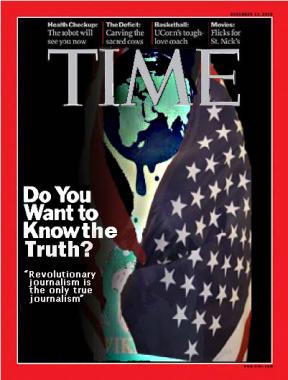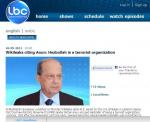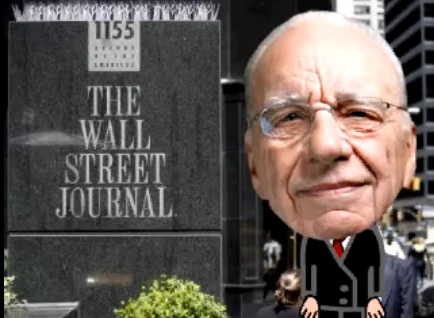
WikiLeak's rise to prominence as the world's first stateless media organization has carried it into the center of a massive storm of controversy. On one hand WikiLeaks and Julian Assange have widespread global support and have won numerous journalism awards. On the other hand, the US government portrayed them as a criminal entity, as a sort of spy organization and certainly not a member of the press protected by the First Amendment. Some top US officials called Assange a high-tech terrorist and should be prosecuted under the Espionage Act of 1917.
With inflamed rhetoric, many in the mainstream media have negatively framed the narrative of this new journalistic force and tried to distance themselves from it. By doing so, they attempted to deflect perception of WikiLeaks from the appearance of legitimacy associated with the word 'journalism'. One tactic was sensational personal attacks, with classic tabloid character assassination of Assange to distract the public from asking questions about the real actions of WikiLeaks. The other was sophisticated intellectual persuasion, where the corporate media criticized the organization, particularly questioning its journalistic status.
 The Lebanese daily newspaper Almustaqbal reported today that the head of Free Patriotic Movement (FPM) in Lebanon General Michel Aoun referred to Hezbollah as a ‘terrorist organisation’ in one of the Wikileaks cables (06Beirut413). Other media outlets reported the story referring to Almustaqbal, and one of them was Lebanese Broadcasting Corporation International (LBCI), where the author read this piece news (on their website).
The Lebanese daily newspaper Almustaqbal reported today that the head of Free Patriotic Movement (FPM) in Lebanon General Michel Aoun referred to Hezbollah as a ‘terrorist organisation’ in one of the Wikileaks cables (06Beirut413). Other media outlets reported the story referring to Almustaqbal, and one of them was Lebanese Broadcasting Corporation International (LBCI), where the author read this piece news (on their website).
Almustaqbal newspaper is owned by the business tycoon, Hezbollah’s political opponent and Former Lebanese Prime Minister Saad Hariri. If this is true, it will be a blow to the current alliance that exists between Michel Aoun and Hezbollah. This alliance has been the corner stone of what’s known as ‘March 8’ camp in the Lebanese politics, which is basically a pro-Hezbollah alliance. Hariri is the leader of ‘March 14’ camp, which is an anti-Hezbollah alliance.
Hezbollah is a main player in Lebanese politics, and has a main regional dimension too. It represents a fore front extension of the alliance between Syria, Iran on the Lebanese borders which stands up to Israel. Going back to the subject cable 06Beirut413 and the story in Almustaqbal. The author actually read this cable before Almustaqbal, and soon after its release. The author decided then NOT to write about it, as he didn’t find anything unusual or already not available in the public domain.
 Several reports on the web security and privacy of the Wall Street Journal’s new site, SafeHouse, which is inspired by WikiLeaks, have been published. Reactions centered around the “terms and conditions” on the website, which include a disclaimer that SafeHouse “cannot ensure complete anonymity." It also states the leak portal “reserve[s] the right to disclose any information about you to law enforcement authorities or to a requesting third party, without notice, in order to comply with any applicable laws and/or requests under legal process.”
Several reports on the web security and privacy of the Wall Street Journal’s new site, SafeHouse, which is inspired by WikiLeaks, have been published. Reactions centered around the “terms and conditions” on the website, which include a disclaimer that SafeHouse “cannot ensure complete anonymity." It also states the leak portal “reserve[s] the right to disclose any information about you to law enforcement authorities or to a requesting third party, without notice, in order to comply with any applicable laws and/or requests under legal process.”
Web security and privacy experts will continue to scrutinize this new venture. Those like Jacob Appelbaum, a security researcher and senior developer on the Tor online anonymity network will continue to let others know the Journal is being negligent and that this is not a project to be beta-tested on an open Internet. In addition to the security questions, there is the larger question of the Journal’s role in the press and why anyone would ever consider leaking to a newspaper like the Journal.
For establishing a basic understanding of this news organization, this is how SourceWatch, run by the Center for Media and Democracy, characterizes the publication: “The Wall Street Journal, an influential international daily newspaper published in New York City, is owned by News Corporation, which is owned by Rupert Murdoch. It does an abysmal job of informing its readers about climate change.”
 Jason Leopold is the deputy managing editor of Truthout.org and a co-founder of The Public Record.
Jason Leopold is the deputy managing editor of Truthout.org and a co-founder of The Public Record.
As an investigative journalist he has written extensively on the Guantanamo Bay detention and torture camp, Enron, and the Military. The list goes on.
In February 2011, Leopold interview Australian David Hicks, a former Guantanamo detainee. It was Hicks' first interview about the torture and abuse he endured at Guantanamo, and his struggle with the injustice of US ex-judicial processes.
Leopold and his colleague, Jeffrey Kaye, have also investigated medical experiments at Guantanamo and psychological techniques used to design Bush's torture program.
His work has been published in The Los Angeles Times, The Nation, Salon, The Wall Street Journal, The San Francisco Chronicle, The Financial Times, Alternet, Z Magazine, Earth Island Journal, Homeland Security Today, and numerous other national and international publications.
Leopold was the recipient of the Project Censored award two times for his investigative work on Halliburton and Enron. He was awarded the Thomas Jefferson award by The Military Religious Freedom Foundation for a series of stories on the rise of Christian fundamentalism in the U.S. Military.
You can find him on twitter at @JasonLeopold.
What is particularly unique about the documents from the latest Wikileaks’ release?
Theme by Danetsoft and Danang Probo Sayekti inspired by Maksimer